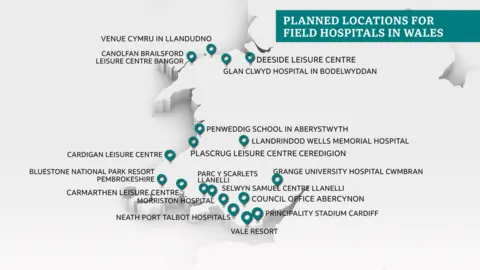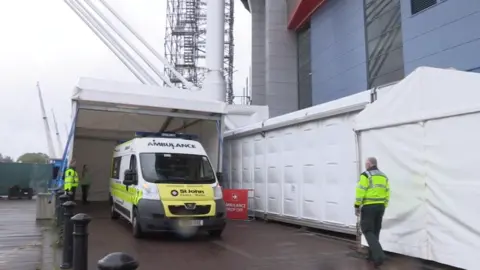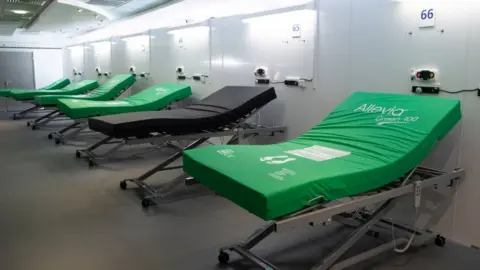Coronavirus: Wales' 19 field hospitals cost £166m to build
It has cost £166m for NHS Wales to effectively double its bed capacity to cope for the potential surge of patients with coronavirus.
More than 6,000 new beds have been set up in 19 Welsh field hospitals inside six weeks.
The Welsh Government has thanked people for following stay-at-home rules as only 35 patients have so far needed to use the temporary hospitals.
The NHS Wales boss wants them to remain in case of new waves of the virus.
There have been at least 1,852 deaths with Covid-19 in Wales up to 8 May, according to official figures.
Medical experts predict Wales is past its first coronavirus peak - but Andrew Goodall says the field hospitals would be "essential" in a coronavirus "resurgence".
"I'm genuinely concerned that we still need to have the flexibility of capacity if we see a resurgence of this virus," he said.
"Over the course of the months to come there is absolute potential to see a second or third peak and that could well be higher than April. I hope that isn't the case."
He said the public obeying social distancing and the stay-at-home measures "reduced that peak" in April but the field hospitals were part of their "reasonable worst case scenario planning."
The extra facilities include the 1,500-bed £8m facility at the Principality Stadium in Cardiff, named Dragon's Heart Hospital, where some patients are still being treated.

Part of Bluestone Holiday Resort in Pembrokeshire, a film studio in Swansea and a theatre in Llandudno have all been turned into field hospitals - with 138,000 pieces of equipment like beds, imaging equipment, syringe drivers and medicines provided.
The Welsh Government has said health boards have been able to "manage demand within normal hospital settings" as some hospitals have enlarged intensive care units.
"This is positive news and the NHS is well-placed to respond to any future challenges posed by the pandemic," said the government spokesperson.
"A total of 35 people have been cared for in field hospitals so far and they remain an important part of our wider strategy to respond to coronavirus."
The Principality Stadium is the overflow for Wales' largest hospital - Cardiff's University Hospital of Wales - which was at one stage in the coronavirus crisis "on the verge of not coping."
Critical care consultant Chris Hingston said his intensive care unit - which had seen more than 750 Covid-19 patients - was a week away from being overrun by coronavirus.
The Welsh Government said Wales' field hospitals would be "used flexibly over the coming months" and it will carry out a "national review" in June.
The Welsh rugby team plan to play five games at the Principality Stadium in the autumn - the rearranged Six Nations game against Scotland in late October and four Test matches in November.
 Cardiff and Vale UHB
Cardiff and Vale UHBThe WRU have rented the ground to Cardiff and Vale University Health Board to use as a field hospital until 10 July.
More than half of the WRU's £90m annual income comes from match day revenue.
But if the coronavirus lockdown is still in place, the Welsh Government - guided by its scientific advisors - would not allow events that attract big crowds to take place due to social distancing measures.
 Getty Images
Getty Images"We have regular dialogue and we are all trying to work our way through that," said WRU chief executive Martin Phillips.
"We are working to the principle if they still need a hospital of that size the impact on rugby will probably be fairly sizeable.
"But if Wales needs a hospital, we would want to play our part in that and that hasn't changed."
